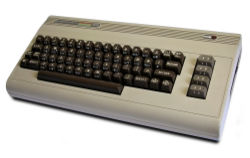Difference between revisions of "Commodore 64"
(Leftover spam by user Mark2web removed.) |
m (Fix small typos and spelling errors) |
||
| Line 11: | Line 11: | ||
| caption = Commodore 64, original design - affectionately known as the "breadbox" | | caption = Commodore 64, original design - affectionately known as the "breadbox" | ||
}} | }} | ||
| − | The '''Commodore 64''' was a tremendously popular and influential [[Commodore Business Machines]] home computer. The | + | The '''Commodore 64''' was a tremendously popular and influential [[Commodore Business Machines]] home computer. The successor to the [[Vic 20]], the Commodore 64, had improved graphics & sound capability, more RAM, and a newer version of Basic. |
| − | What can be said of the Commodore 64, other then is was the most manufactured computer for | + | What can be said of the Commodore 64, other then is was the most manufactured computer for its time. And even with its limited capabilities, its video game prowess was second to none for a long stretch of the 1980’s. |
Perhaps the two major reasons behind this was the SID chip, giving the C64 great audio capabilities, as it was designed by Bob Yannes, a digital synthesizer enthusiast. The next big advantage the C64 held was the VIC-II chip, which allowed for 16 colors to be displayed simultaneously on the screen, along with hardware sprites. | Perhaps the two major reasons behind this was the SID chip, giving the C64 great audio capabilities, as it was designed by Bob Yannes, a digital synthesizer enthusiast. The next big advantage the C64 held was the VIC-II chip, which allowed for 16 colors to be displayed simultaneously on the screen, along with hardware sprites. | ||
Revision as of 12:36, 26 August 2012
| Commodore 64 | |
 Commodore 64, original design - affectionately known as the "breadbox" | |
| Manufacturer: | Commodore Business Machines |
|---|---|
| Year Introduced: | August 1982 |
| Form Factor: | Microcomputer |
| Clock Speed: | 1 MHz |
| Memory Size: | 64 KB |
| CPU: | MOS 6510 |
| Operating System: | In-ROM Microsoft BASIC v 2.0 |
The Commodore 64 was a tremendously popular and influential Commodore Business Machines home computer. The successor to the Vic 20, the Commodore 64, had improved graphics & sound capability, more RAM, and a newer version of Basic.
What can be said of the Commodore 64, other then is was the most manufactured computer for its time. And even with its limited capabilities, its video game prowess was second to none for a long stretch of the 1980’s.
Perhaps the two major reasons behind this was the SID chip, giving the C64 great audio capabilities, as it was designed by Bob Yannes, a digital synthesizer enthusiast. The next big advantage the C64 held was the VIC-II chip, which allowed for 16 colors to be displayed simultaneously on the screen, along with hardware sprites.
It wasn’t until the Amiga became more mainstream in use, and video games simply wouldn’t fit in the C64’s meager memory & disk space did the platform start to wane. Up until the end, it wasn’t that uncommon for games to come on multiple diskettes, and since the 1541 was a single sided drive, users had to also flip the diskette.
Contents
Periphials
The commodore 64 was released with the following devices over its lifetime from Commodore.
Disk Drives
Tape Drives
Modems
Mice
Ram Expansion
Printers
Software
Perhaps the best konwn software associated with the Commodore 64 is Geos. A GUI for the platform that popularized WYSIWYG publishing on the platform.
Lore
The Commodore 64 is the best selling of any single model of computer ever. It is estimated to have sold over 30 million units.
Emulators
There are various emulators for the Commodore 64 and its ilk.
Misc
The Commodore 64, was replaced by the Commodore 128.